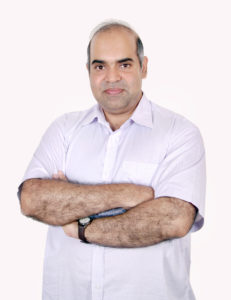Focus on Mahmud Shahriar Hossain…..a DAC alumnus interview

Mahmud Shahriar Hossain, DAC Alumnus
Mahmud Shahriar Hossain was recently promoted to associate professor of computer science, with tenure, at the University of Texas at El Paso (UTEP). He leads the university’s Discovery Analytics Lab. Hossain earned his Ph.D. in computer science from Virginia Tech in 2012 and joined UTEP as an assistant professor in 2013.
While at the Discovery Analytics Center at Virginia Tech, his work with advisor, Naren Ramakrishnan focused on event analysis, “storytelling,” and data abstraction techniques like alternative clustering and scatter/gather clustering. He applied his methods to solve a broad spectrum of problems in multiple disciplines, including national security, biomedical science, and mechanical engineering.
Still fascinated by event analysis and prediction using news and also using scientific literature, Hossain received a three-year award from the U.S. Army Engineering Research and Development Center, U.S. Army Corps of Engineers, to conduct research related to this topic. His team, which included two Ph.D. students, developed advanced language models that incorporated text, images, and temporal aspects.
In a recent interview, Hossain reflected on his life as a DAC student, shared his passion for teaching, and offered advice garnered from his own experience.
— When did you know that academia was the right path for you?
From childhood, I knew I wanted to be a teacher. But, like many kids in Bangladesh, I also wanted to be an engineer and a doctor – all at the same time! Slowly, I figured that academia is the only place where I can be all three. I have a doctorate in computer science, I teach, and I am an engineer. So academia is like a dream come true for me.
— How did you wind up at Virginia Tech and more specifically, at DAC?
My wife Monika Akbar and I were pursuing our master’s degrees at Montana State University while applying for admission to Ph.D. programs. We had a number of options. But the program director at Virginia Tech, Dr. Ramakrishnan, was the only one who asked to speak with us by phone. I knew of him because he had chaired the IEEE International Conference on Data Mining the year before. I was fascinated by his research, which perfectly aligned with my own interest in data mining and machine learning. After a 35-minute conversation, Monika and I agreed Virginia Tech was our best option and I joined DAC right from the start.
— Once you were actually settled in, what did you like best about DAC?
The whole time I was working on my Ph.D., DAC’s laboratory environment, with opportunities to collaborate, had the most impact on me. It helped me grow as a researcher. The lab was really our first home. Our apartment was second.
— How important do you think mentoring is for graduate students?
As a first-year student, I met Dr. Ramakrishnan three to four times a week for his feedback on my research. It was so encouraging and valuable to have that kind of experience. Now, on the faculty side, I view mentoring as a critical element of my job. There are so many aspects — from research to course work to work-life balance to having a plan for the future. I take it all very seriously. As mentors, we need to make sure that our graduate students are utilizing their time and energy well for their professional development.
— Are you using what you learned at DAC in your current position?
Oh, yes. Everything at DAC was state-of-the-art. And I am guided by what might be the biggest lesson I learned: Never become too satisfied with your research.
— Reflecting on your own experience, can you offer any advice
…for current DAC students?
Develop as many skills as you can. This includes writing, presentation, other communication and time-management skills.
Collaborate with researchers from other labs. Being able to work with diverse disciplines is a strength that you can leverage to grow your research. Additionally, cross-disciplinary research is beneficial for society.
If your goal is academia, learn how to write a proposal.
…for new graduates entering the workforce?
Be willing to go beyond your comfort zone.
…for professors seeking tenure?
Collaboration is the key.
— Aside from your research, do you have a special interest?
Yes. It stems from my passion for teaching. I believe that anyone can succeed in learning computer skills if they have the appropriate, easy-to-understand materials. Monika and I designed a website, Computing for All. We develop programming-related videos and upload them to the site. We hope that learners worldwide will benefit. We launched about five months ago and have about 500 subscribers.
— Do you have any leisure time left for hobbies?
Not many people know this about me, but I love woodworking.